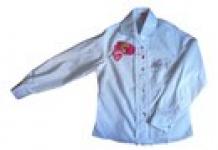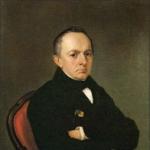War was a cruel and rude school for children. They were not sitting at desks, but in frozen trenches, and in front of them were not notebooks, but armor-piercing shells and machine-gun belts. They did not yet have life experience and therefore did not understand the true value of simple things that you do not attach importance to in everyday peaceful life.
The war filled their spiritual experience to the limit. They could cry not from grief, but from hatred, they could childishly rejoice at the spring crane wedge, as they never rejoiced either before the war or after the war, with tenderness to keep in their souls the warmth of a bygone youth. Those who survived returned from the war, having managed to preserve in themselves a pure, radiant world, faith and hope, becoming more irreconcilable to injustice, kinder to good.
Although the war has already become history, the memory of it must live on, because the main participants in history are People and Time. Not to forget the Time means not to forget the People, not to forget the People - it means not to forget the Time.
(According to Yu. Bondarev)
Try to break the text you wrote into 3 paragraphs according to the meaning.
1 version of the presentation
PARAGRAPH 1
The war was a cruel school for children. They sat in frozen trenches, not in warm classrooms; instead of notebooks and pens, they had machine-gun belts and shells. The guys behind them had no life experience and understanding of the true value of the simplest things. (42 words)
Count the number of words in the first paragraph.
PARAGRAPH 2
All this was “given” to the children by the war, which made them tenderly keep in their souls what was before June 21, 1941, rejoice at what they had passed before indifferently, and cry not from grief, but from hatred. The war helped the young soldiers to keep their faith in a clean world, justice, kindness. (48 words)
Count the number of words in the second paragraph.
PARAGRAPH 3
The war has become history, but it lives in human memory, because both people and time are still alive. That's how it should be! (21 words)
Count the number of words in the third paragraph
Happened summary
OPTION 1
The war was a cruel school for children. They sat in frozen trenches, not in warm classrooms; instead of notebooks and pens, they had machine-gun belts and shells. The guys behind them had no life experience and understanding of the true value of the simplest things.
All this was “gave” to children by the war, which made them tenderly keep in their souls what was before June 21, 1941, rejoice at what they had previously passed by indifferently, and cry not from grief, but from hatred. The war helped the young soldiers to keep their faith in a pure world, justice, kindness.
The war has become history, but it lives in human memory, because both people and time are still alive. That's how it should be!
(111 words)
2 presentation option
1 paragraph
The war was a cruel school for children. They sat in frozen trenches, not in warm classrooms, instead of notebooks and pens they had weapons. These guys lacked life experience and understanding of the true value of the simplest things. (37 words)
2 paragraph
All this was “given” to the children by the war, which forced them to tenderly keep in their souls what was before June 21, 1941 ... The war helped the young soldiers to maintain faith in a pure world, justice, kindness. (33 words)
3 paragraph
The war has long been history, but the memory of it must live on. We must remember those soldiers and that harsh time! (twenty)
Got a summary
OPTION 2
The war was a cruel school for children. They sat in frozen trenches, not in warm classrooms, instead of notebooks and pens they had weapons. These guys lacked life experience and understanding of the true value of the simplest things.
The war “gave” all this to the children, forcing them to tenderly keep in their souls what was before June 21, 1941 ... The war helped the young soldiers to preserve their faith in a pure world, justice, kindness.
The war has long been history, but the memory of it must live on. We must remember those soldiers and that harsh time!
90 words
Description of the presentation on individual slides:
1 slide
Description of the slide:
Learning to write a summary. Teacher MBOU secondary school No. 6 of the city of Dimitrovgrad, Ulyanovsk region L.Yu. Abramova
2 slide

Description of the slide:
The purpose of the lesson is to teach how to write a concise presentation: highlighting micro-topics, finding key (reference) words, explaining spelling, concise presentation of the text, using methods and techniques of compression.
3 slide
Description of the slide:
Text No. 1. The war was a cruel and rude school for children. They were not sitting at desks, but in frozen trenches, and in front of them were not notebooks, but armor-piercing shells and machine-gun belts. They did not yet have life experience and therefore did not understand the true value of simple things that you do not attach importance to in everyday peaceful life. The war filled their spiritual experience to the limit. They could cry not from grief, but from hatred, they could childishly rejoice at the spring crane wedge, as they never rejoiced either before the war or after the war, with tenderness to keep in their souls the warmth of bygone youth. Those who survived returned from the war, having managed to preserve in themselves a pure, radiant world, faith and hope, becoming more irreconcilable to injustice, kinder to good. Although the war has already become history, the memory of it must live on, because the main participants in history are People and Time. Not to forget the Time means not to forget the People, not to forget the People - it means not to forget the Time. (According to Yu. Bondarev)
4 slide
Description of the slide:
5 slide
Description of the slide:
The first micro-theme: The war was a cruel and rude school for children. They were not sitting at desks, but in frozen trenches, and in front of them were not notebooks, but armor-piercing shells and machine-gun belts. They did not yet have life experience and therefore did not understand the true value of simple things that you do not attach importance to in everyday peaceful life.
6 slide
Description of the slide:
Keywords. War was a cruel and rude school for children. They were not sitting at desks, but in frozen trenches, and in front of them were not notebooks, but armor-piercing shells and machine-gun belts. They did not yet have life experience and therefore did not understand the true value of simple things that you do not attach importance to in everyday peaceful life.
7 slide
Description of the slide:
Exclusion of details, details The war was a cruel and rude school for children. They were not sitting at desks, but in frozen trenches, and in front of them were not notebooks, but armor-piercing shells and machine-gun belts. War was a cruel and rude school for children. They were not sitting at their desks, but in the trenches, and in front of them were not notebooks, but shells.
8 slide

Description of the slide:
Replacing a fragment of a sentence with a synonymous expression They did not yet have life experience ... They did not have life experience.
9 slide
Description of the slide:
Replacement complex sentence simple, replacement of a sentence fragment with a synonymous expression, exclusion of a sentence fragment. They did not yet have life experience and therefore did not understand the true value of simple things that you do not attach importance to in everyday peaceful life. They had no life experience. They did not understand the true value of the simple things of a peaceful life.
10 slide
Description of the slide:
11 slide
Description of the slide:
War was a cruel and rude school for children. They were not sitting at their desks, but in the trenches, and in front of them were not notebooks, but shells. They had no life experience. They did not understand the true value of the simple things of a peaceful life.
12 slide
Description of the slide:
Micro-theme 2: The war filled their spiritual experience to the limit. They could cry not from grief, but from hatred, they could childishly rejoice at the spring crane wedge, as they never rejoiced either before the war or after the war, with tenderness to keep in their souls the warmth of bygone youth. Those who survived returned from the war, having managed to preserve in themselves a pure, radiant world, faith and hope, becoming more irreconcilable to injustice, kinder to good.
13 slide
Description of the slide:
Key words: The war filled their spiritual experience to the limit. They could cry not from grief, but from hatred, they could childishly rejoice at the spring crane wedge, as they never rejoiced either before the war or after the war, with tenderness to keep in their souls the warmth of bygone youth. Those who survived returned from the war, having managed to preserve in themselves a pure, radiant world, faith and hope, becoming more irreconcilable to injustice, kinder to good.
14 slide
Description of the slide:
Elimination of repetitions; reduction of some homogeneous members of the proposal; exclusion of details, details. The war filled their spiritual experience to the limit. They could cry not from grief, but from hatred, they could childishly rejoice at the spring crane wedge, as they never rejoiced either before the war or after the war, with tenderness to keep in their souls the warmth of bygone youth. The war filled their spiritual experience to the limit. They could cry with hatred, rejoice like a child in what they did not rejoice before the war, kept the warmth of youth in their souls.
15 slide
Description of the slide:
Replacing a sentence fragment with a synonymous expression; replacement of homogeneous members with a generalized name; exclusion of details, details. Those who survived returned from the war, having managed to preserve in themselves a pure, radiant world, faith and hope, becoming more irreconcilable to injustice, kinder to good. Those who returned from the war did not spend all the best in themselves, but became kinder to goodness.
16 slide
Description of the slide:
17 slide
Description of the slide:
The war filled their spiritual experience to the limit. They could cry with hatred, rejoice like a child in what they did not rejoice before the war, kept the warmth of youth in their souls. Those who returned from the war did not spend all the best in themselves, but became kinder to goodness.
18 slide
Description of the slide:
Microtopic 3: Although the war has already become history, the memory of it must live on, because the main participants in history are People and Time. Not to forget the Time means not to forget the People, not to forget the People - it means not to forget the Time. (According to Yu. Bondarev)
19 slide
Description of the slide:
Key words: Although the war has already become history, the memory of it must live on, because the main participants in history are People and Time. Not to forget the Time means not to forget the People, not to forget the People - it means not to forget the Time.
20 slide
Description of the slide:
Replacing a complex sentence with two. Although the war has already become history, the memory of it must live on, because the main participants in history are People and Time. Not to forget the Time means not to forget the People, not to forget the People - it means not to forget the Time. The war has become history, but the memory of it must live on. The participants in history are People and Time. Not to forget Time is not to forget People, not to forget People is not to forget Time.
21 slide
Description of the slide:
Replacing a sentence with a synonymous expression. Although the war has already become history, the memory of it must live on, because the main participants in history are People and Time. Not to forget the Time means not to forget the People, not to forget the People - it means not to forget the Time. The war has become history, but the memory of it must live on. Participants of history - People and Time. This must not be forgotten. (Neither one nor the other should be forgotten.)
22 slide
Text of presentation No. 2
War was a cruel and rude school for children. They were not sitting at desks, but in frozen trenches, and in front of them were not notebooks, but armor-piercing shells and machine-gun belts. They did not yet have life experience and therefore did not understand the true value of simple things that you do not attach importance to in everyday peaceful life.
The war filled their spiritual experience to the limit. They could cry not from grief, but from hatred, they could childishly rejoice at the spring crane wedge, as they never rejoiced either before the war or after the war, with tenderness to keep in their souls the warmth of a bygone youth. Those who survived returned from the war, having managed to preserve in themselves a pure, radiant world, faith and hope, becoming more irreconcilable to injustice, kinder to good.
Although the war has already become history, the memory of it must live on, because the main participants in history are People and Time. Not to forget the Time means not to forget the People, not to forget the People - it means not to forget the Time.
(According to Yu. Bondarev)
Try to break the text you wrote into 3 paragraphs according to the meaning.
1 version of the presentation
PARAGRAPH 1
and not in warm classrooms, instead of notebooks and pens, they had machine-gun belts and shells. The guys behind them had no life experience and understanding of the true value of the simplest things. (42 words)
Count the number of words in the first paragraph.
PARAGRAPH 2
All this was “given” to the children by the war, justice, kindness. (48 words)
Count the number of words in the second paragraph.
PARAGRAPH 3
The war has become history, but it lives in human memory, because both people and time are still alive. That's how it should be! (21 words)
Count the number of words in the third paragraph
Got a summary
OPTION 1
The war was a cruel school for children. They sat in frozen trenches, not in warm classrooms; instead of notebooks and pens, they had machine-gun belts and shells. The guys behind them had no life experience and understanding of the true value of the simplest things.
All this was “given” to the children by the war, which made them tenderly keep in their souls what was before June 21, 1941, rejoice at what they had passed before indifferently, and cry not from grief, but from hatred. The war helped the young soldiers to keep their faith in a pure world, justice, kindness.
The war has become history, but it lives in human memory, because both people and time are still alive. That's how it should be!
(111 words)
2 presentation option
1 paragraph
The war was a cruel school for children. They sat in frozen trenches, not in warm classrooms, instead of notebooks and pens they had weapons. These guys lacked life experience and understanding of the true value of the simplest things. (37 words)
2 paragraph
All this was “given” to the children by the war, justice, kindness. (33 words)
3 paragraph
The war has long been history, but the memory of it must live on. We must remember those soldiers and that harsh time! (twenty)
Got a summary
OPTION 2
The war was a cruel school for children. They sat in frozen trenches, not in warm classrooms, instead of notebooks and pens they had weapons. These guys lacked life experience and understanding of the true value of the simplest things.
All this was “given” to the children by the war, which forced them to tenderly keep in their souls what was before June 21, 1941 ... The war helped the young soldiers to maintain faith in a pure world, justice, kindness.
The war has long been history, but the memory of it must live on. We must remember those soldiers and that harsh time!
90 words
Russian language lesson in 9th grade.
Topic: "Preparation for writing a concise presentation in the exam paper of the OGE"
Equipment for the lesson: computer, projector, handouts with the text of the presentation, notes on writing a concise presentation.
Lesson Objectives:
1. Formation of knowledge and skills to compress the text;
2. Development of literate writing skills during independent work;
3. Improving universal learning activities with text: find the right information.
Lesson objectives: training of various logical operations with text:
- selection of main and secondary information;
- text compression in different ways;
- recording of a coherent and logically correct compressed text that does not distort the content and does not violate the logic of the original.
DURING THE CLASSES
1.Org. moment.
2. Immersion in the topic of the lesson.
What is a summary.
How can we compress text?(slide 1)
EXCEPTION details and details | GENERALIZATION concrete, single phenomena | SIMPLIFICATION syntactic structures |
- elimination of repetitions of words or phrases - exclusion of one or more of the synonyms - exclusion of clarifying and explanatory constructions - exclusion of a sentence fragment, some homogeneous members of the sentence; - exclusion of one or more sentences - exclusion of sentences with descriptions and reasoning | - replacement of homogeneous terms General name - replacement offer or its parts are definitive or negative generalizing pronoun value | - merging multiple sentences into one - replacing a sentence or part of it with a demonstrative pronoun - replacing a complex sentence with a simple one - replacing a sentence fragment with a synonymous expression |
Formation of goals and objectives of the lesson (students formulate).
- What goals and objectives will we have to solve during the lesson?
3. Work on the main topic of the lesson
Read the wording of task 1 of the OGE.
Listen to the text and write a concise summary.
Please note that you must convey the main content of both each micro-topic and the entire text as a whole.
The volume of presentation is not less than 70 words.
Write your essay in neat, legible handwriting.
Once again, consider the criteria for evaluating the presentation. ( slide 2)
4. We design the page in workbook . (slide 3)
Let's define the most important thing that is necessary for writing a high-quality concise presentation:
1) Accurately convey the BASIC content of the listened text.
2) Reflect all the micro-themes that are important for his perception.
3) Write a competent presentation without violating the paragraph division of the text.
4) Maintain the normalized number of words - at least 70.
But the most important thing is to understand the theme, the idea of the text. Let's remember the basic information about the text:(slide 4)
What is text?
Text - a group of sentences united into one whole by a topic and a main idea. The sentences in the text are connected in meaning and with the help of linguistic means of communication.
What is the topic of the text?
Topic - what the text says.
What is the idea of the text?
Idea - conveys the attitude of the author to the subject of speech, his assessment of the depicted.
We answer ourselves the questions: “Why did the author write this text?”, “What thought did you want to express?”
What is a microtheme?
microtheme - part of a common theme.
Around the micro-topic, sentences are grouped that make up part of the text, which are called paragraph
5. Reading and analyzing text ( slide 5)
War was a cruel and rude school for children. They were not sitting at desks, but in frozen trenches, and in front of them were not notebooks, but armor-piercing shells and machine-gun belts. They did not yet have life experience and therefore did not understand the true value of simple things that you do not attach importance to in everyday peaceful life.
The war filled their spiritual experience to the limit. They could cry not from grief, but from hatred, they could childishly rejoice at the spring crane wedge, as they never rejoiced either before the war or after the war, with tenderness to keep in their souls the warmth of a bygone youth. Those who survived returned from the war, having managed to preserve in themselves a pure, radiant world, faith and hope, becoming more irreconcilable to injustice, kinder to good.
Although the war has already become history, the memory of it must live on, because the main participants in history are People and Time. Not to forget the Time means not to forget the People, not to forget the People - it means not to forget the Time.
6. Text conversation.
What is this text about?
How many paragraphs does it have? Remember that the amountmicrothemes (narrow topics)often (but not always) the same as the number of paragraphs.
3 paragraphs - 3 micro topics in this text.
Formulate and write down on your sheets the abstracts of each micro-theme,
highlight the most important keywords(each student works independently).
AT As a result, the following entries should appear:
(slide 6)
1 paragraph - The cruel school of war.
2 paragraph - "Emotional experience" of military childhood.
3 paragraph - The memory of the war must live.
Underline in the text words, sentences, semantic parts that can be removed without compromising the content.
7. Working with text
Editing 1 paragraph:
We exclude one of the adjectives in 1 sentence. We exclude one of the homogeneous circumstances of the place in the second sentence and generalize the homogeneous subjects. Simplifying the third proposition, we get:
The children went through the cruel school of war in the frozen trenches with weapons in their hands instead of notebooks. They did not yet have the life experience to truly appreciate what you do not attach importance to in civilian life.(slide 7)
Editing paragraph 2:
We simplify: from three sentences we make one, complicated separate circumstance, expressed by adverbial turnover. "Radiant and pure world" was replaced with "purity of the world":
The war filled their spiritual experience, making them not only cry from hatred, but also rejoice at the crane wedge, tenderly keep the warmth of the departing youth, preserve the purity of the world, faith and hope, become kinder and at the same time more implacable to injustice.(slide 8)
Editing paragraph 3:
We exclude the last sentence of the paragraph as repeating the idea of the first:
The war has become history, but it must be remembered, because the main participants in history are People and Time.(slide 9)
- In the remaining text, replace repetitions with pronouns, synonyms. Do not forget about the coordination of the members of the proposal among themselves and about the means of communication in the proposals.
Count the number of words in the resulting text, check for grammatical errors in him.
Rewrite the received text in a notebook.
8. Summary of the lesson
And now let's remember all the stages of working on the text and put together an algorithm.
- Determine the topic and formulate the main idea.
- We determine the structure of the text.
- We highlight microthemes (narrow topics of the text).
- We select the main and secondary information in each microtopic. Highlight key information.
- We write down the abstracts of each microtopic (that is, statements containing keywords). We draw up a basic outline or plan.
- We exclude details, details, generalize specific details and simplify syntactic constructions.
- We unite microthemes with “connective words”.
- We check whether the author's idea is conveyed without distortion, whether the sequence, the logic of the story is preserved.
9. Homework.
Each student is given sheets of text and assignments for it.
Tasks by type of GIA
Concise Statement
The war was a cruel and rough school for children. They did not sit at their desks, but in frozen trenches and in front of them were not notebooks, but armor-piercing shells and machine-gun belts. They did not yet have life experience and therefore did not understand the true value of simple things that you do not betray in daily peaceful life
Those who survived returned from the war, having managed to preserve in themselves a pure radiant world, faith and hope, becoming more indifferent to injustice, kinder to good. Although the war has already become history, the memory of it must live on, because the main participants in history are people. and time Do not forget time, that means do not forget people, do not forget people, that means do not forget time The war was a cruel and rough school for children. machine-gun belts They did not yet have life experience and therefore did not understand the true value of simple things that you do not betray importance in everyday peaceful life
The war filled their spiritual experience to the limit. They could cry not from grief, but from hatred;
Those who survived returned from the war, having managed to preserve in themselves a pure radiant world, faith and hope, becoming more indifferent to injustice, kinder to good
Although the war has already become history, the memory of it must live on, because the main participants in history are people and time Do not forget time, it means do not forget people, do not forget people, it means do not forget time
- The war was a cruel school for children. After all, they still did not have life experience and therefore did not understand the value of simple things, which you will not betray the value in Everyday life.
The war filled the children's spiritual experience to the limit. They could cry not from grief, but from hatred, they could childishly rejoice at simple things that they had not noticed before the war.
Those who returned from the war managed to keep their faith and hope. Although the war has already become history, its memory must live on, because the main participants in history are people and time, which should not be forgotten. - The war was a rough school for children, they were taught not by notebooks and books, but by armor-piercing shells. They were small and did not understand the value of everyday things. The war filled them with life experience: they cried not from grief, but from hatred, they rejoiced at what they would not have turned their eyes to before. The survivors managed to keep their faith and hope in themselves, they realized their real virtues.
The war has become a thing of the past, it has already become history, but we must preserve the memory of it, because its main participants are time and people. Not to forget that time means not to forget everything that happened then: exhausted, but happy faces, all the importance of that great day - Victory Day!if so, fix it
Send
cool
Link
Pin it
Concise Statement The war was a cruel and rough school for children. They did not sit at their desks, but in frozen trenches and in front of them were not notebooks, but armor-piercing shells and machine-gun belts. They did not yet have life experience and therefore did not understand the true value of simple things that you betray the importance in everyday peaceful life The war filled their spiritual experience to the limit They could cry not from grief, but from hatred, they could rejoice childishly at the spring crane wedge, as they never rejoiced not before the war, not after the war, with tenderness to keep warm in their souls of bygone youth Those who survived returned from the war, having managed to preserve in themselves a pure radiant peace, faith and hope, becoming more indifferent to injustice, kinder to good. Although the war has already become history, but the memory of it must live, because the main participants in history these are people and time Not to forget time, it means not to forget people, not to forget people, it means not to forget time The war was a cruel and rude school for children. behind the desks, but in the frozen trenches and in front of them were not notebooks, but armor-piercing shells and machine-gun belts. They did not yet have life experience and therefore did not understand the true value of simple things that you do not betray importance in everyday peaceful life. The war filled their spiritual experience to limit They could cry not from grief, but from hatred, they could childishly rejoice at the spring crane wedge, as they never rejoiced, not before the war, not after the war, with tenderness to keep in their souls the warmth of a bygone youth Those who remained alive returned from the war, having managed to preserve a pure radiant peace, faith and hope, becoming more indifferent to injustice, kinder to good Although the war has already become history, the memory of it must live on, because the main participants in history are people and time Do not forget time, it means not to forget people, don't forget people, it means don't forget time




















